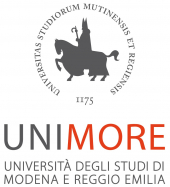BRIEF DESCRIPTION OF THE ORGANISATION
The University of Modena and Reggio Emilia (UNIMORE), founded in 1175, is among the oldest universities in the world and has always been ranked among the top Italian universities for quality of teaching and research. Nowadays UNIMORE is composed of 13 Departments, 1 School of Medicine, 16 interdisciplinary research centres, 13 PhD courses, 26,712 students. Unimore has 32 Master’s degree programmes and 44 bachelor’s degree programmes, 6 Single-Cycle Master’s Degree programmes and 6 Master’s degree Programmes taught in English. It has more than 250 international exchange agreements and invests 1 million € for year in mobility programmes. Currently, UNIMORE project portfolio comprises: n. 19 KA2 Strategic Partnerships (n. 6 KA201 - School Education; n. 6 KA202 - Vocational Education and Training; n. 4 KA203 - Higher education; n. 2 KA204 - Adult Education; n. 1 KA207 - Partnerships for Creativity); n. 1 KA3 - Support for policy reform; n. 1 SPORT - Support for Collaborative Partnerships in the field of Sport; n. 1 Jean Monnet Academic Module; 90 projects under H2020 Programme (n. 14 projects are coordinated by UNIMORE) and 59 other projects supported by different international funds.
The University of Modena and Reggio Emilia wants to pursue the principle of Sustainable Development and Sustainability in all its many aspects: from Environmental Sustainability to Economic and Social Sustainability. This commitment translates into the promotion and implementation of actions aimed at Sustainability, firstly within the University, and secondly in the promotion and enhancement of initiatives outside the University itself (research projects, public engagement activities).
A permanent observatory of the state of sustainability of our University is already active on issues such as climate change, food, education, energy, inclusion and social justice, mobility, waste and resources.
The Departments of the University of Modena have differentiated know how and expertise on various sustainability subjects ranging from Engineering to Economics, thereby including - at the Department of Economics Marco Biagi - sustainable and green finance.
HOW THE ORGANISATION WILL CONTRIBUTE TO THE DISSEMINATION AND EXPLOITATION OF THE PROJECT RESULTS
UNIMORE will contribute virtually and at no cost to the dissemination of the project to inform the potential users about the project results, improve the visibility and impact of the project and spread the project’s results as widely and effectively as possible. The identified actions for dissemination are: article on websites, informative mailing, sharing contents on social media.
UNIMORE will exploit the results of the project following the meetings where this project will be presented

